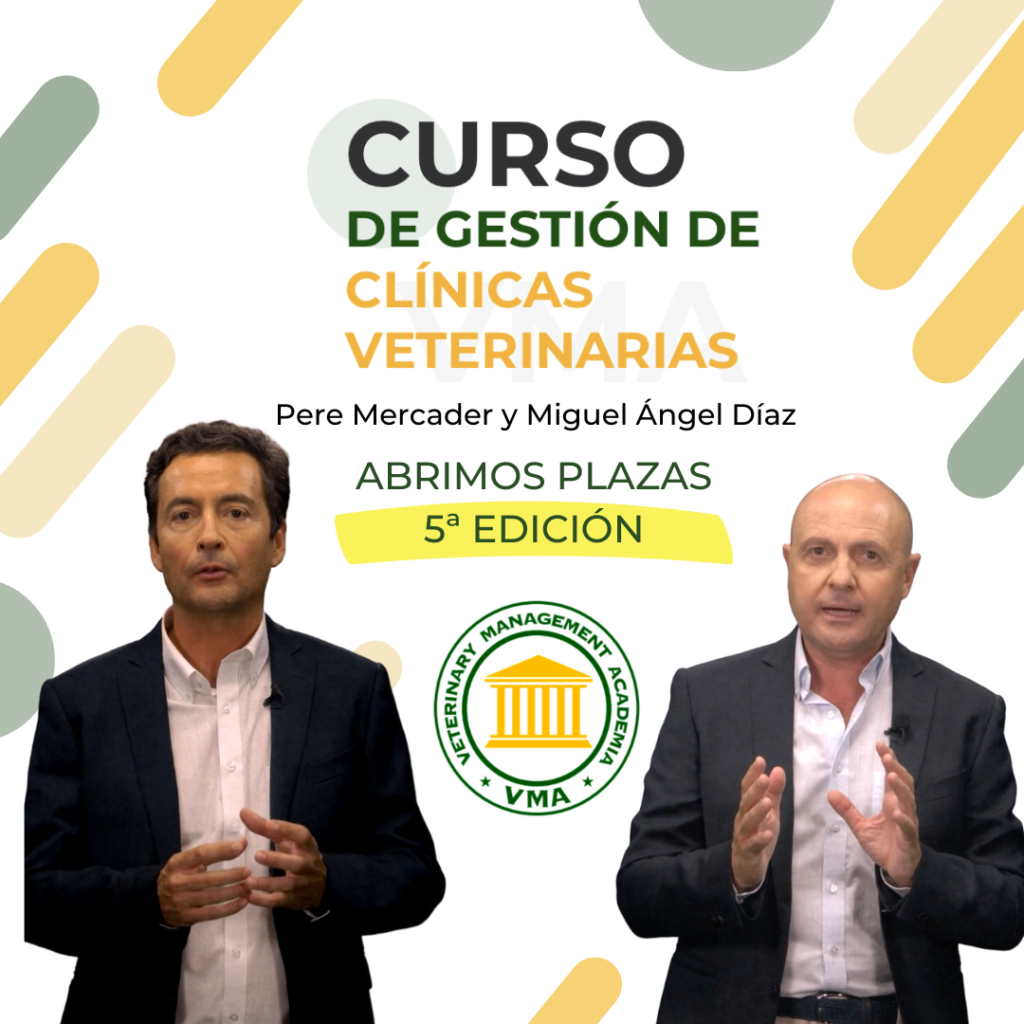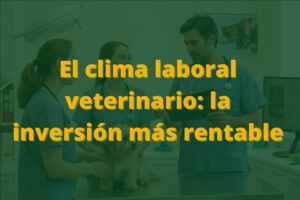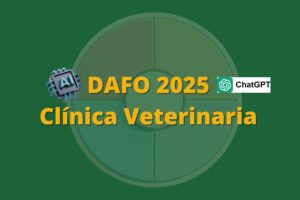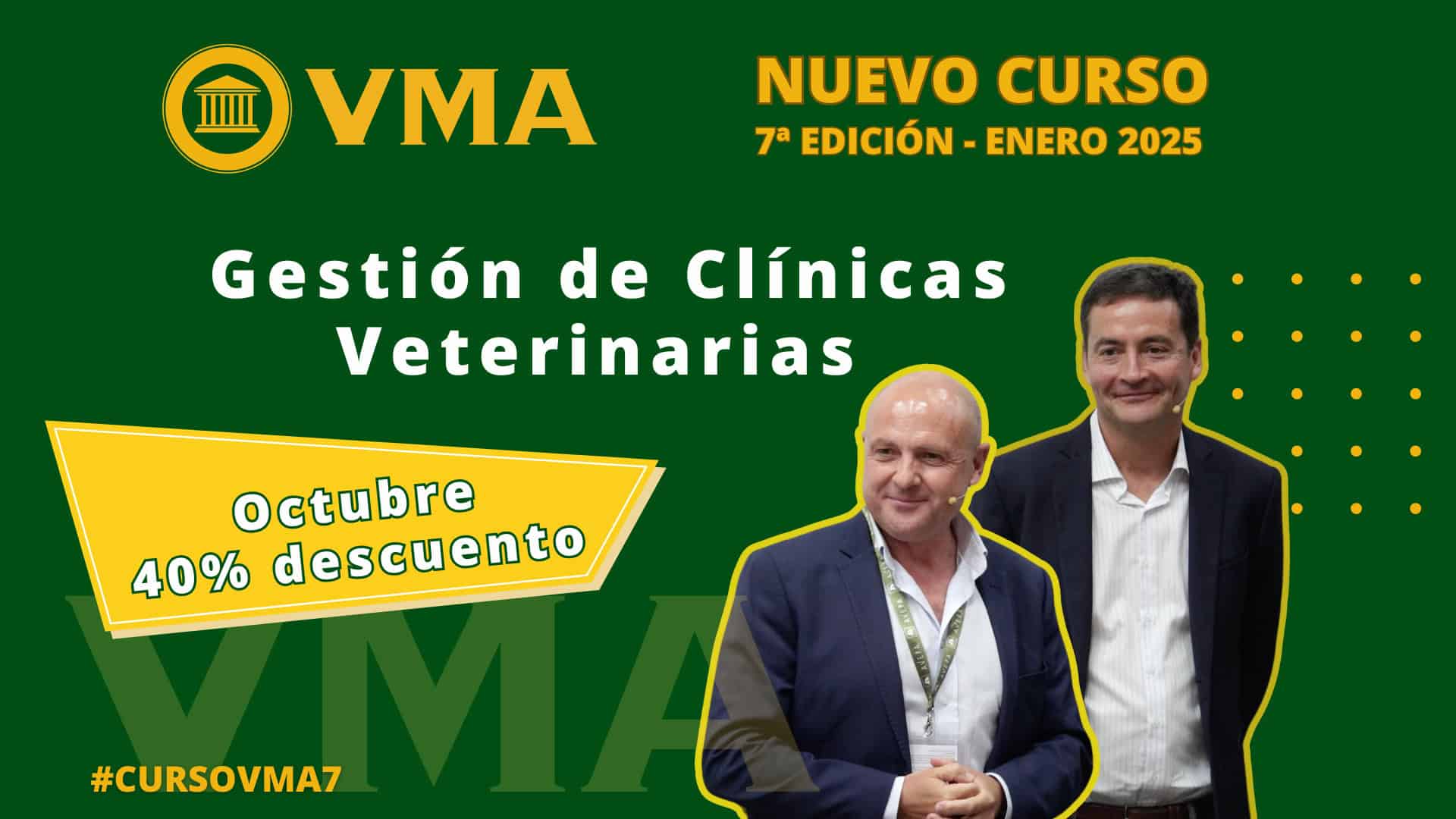We welcome all veterinarians interested in improving the management of their veterinary practice!
We already have a date for the 5th edition of the veterinary clinic management course will be held the week of April 11 and we are finalizing the preparations and news.
We feel very fortunate to know that We have already trained almost 150 veterinary colleagues, auxiliaries, industry professionals and practice managers.
Fortunately we have a lot of contact with them and we know that they have put into practice what they have learned in our course and have made great improvements in their centers.
These are the opinions of some of the students from last year's edition:


What does the 5th Edition of the VMA Management Course offer?
The VMA's Veterinary Clinic Management Courseconsists of several modules designed to help veterinarians to improve their management and leadership skills. Since the from financial management to personal development and leadership, not forgetting communication.
During the course, students will have the opportunity to learn from world experts in management, such as Pere Mercader y Miguel Angel Diazand to share their own experiences and challenges with other veterinarians in a collaborative environment.
In addition, the course offers practical tools and resources to apply what has been learned in the modules.This can help improve the quality of medical care provided to patients and increase customer satisfaction.
If you are a veterinarian who wants to improve your clinical management and leadership, this course is for you. These are the 8 online modules that are taught over 10 weeks:
🔸Module 1: Decisions that will shape my career as a veterinarian
▪️Emprender or not to undertake, that is the question.
▪️Especializarse or not, that is the (second) question.
▪️Trabajar for an independent veterinary practice, or for a group practice, that is the (third) question.
▪️Gestionar or not to manage, that is the (fourth) question.
▪️La importance of money in professional life.
🔸Module 2: My personal development as a partner, as a subordinate and as a "boss" at the veterinary center
▪️Análisis of SWOT Strengths, Weaknesses, Opportunities and Threats.
▪️El power of Trust.
▪️La importance of the selection interview.
▪️Claves for success in the first 30 days in the clinic.
🔸Module 3: Controlling the economic health of a veterinary facility
▪️Por what is necessary to monitor the clinic's finances.
▪️Qué is a KPI (key management indicator).
▪️Seguimiento of the clinic's revenue health.
▪️Seguimiento of the health of the clinic costs.
▪️Hablar of the clinic's economics with the employees: right or wrong?
🔸Module 4: Making good economic decisions in the veterinary practice
▪️Cómo define the prices of veterinary services: key mistakes to avoid.
▪️Los discounts, a lethal virus for clinic profitability.
▪️Cómo calculate how much I can pay a veterinarian at my clinic.
▪️Cómo calculate whether the sale of a product is profitable (and how profitable) for our clinic.
▪️Cómo analyze an investment in a new machine for our clinic.
🔸Module 5: Customer orientation in the veterinary center: measuring satisfaction and loyalty
▪️CLTV (customer life-time value) and the main customer loyalty metrics.
▪️Impacto economic of good complaint management.
▪️Cómo to measure customer satisfaction.
▪️NPS (Net Promoter Score) applied to the veterinary center.
▪️Orientación to the customer: a philosophy with measurable results.
🔸Module 6: Communicating successfully with the veterinary center's clients
▪️La importance of communicating well in consultation: surprising facts and false beliefs.
▪️La Calgary Cambridge Guide: the 7 steps to impress the client in consultation.
▪️Cómo handle and doubt objections from clients in consultation.
▪️Los most common mistakes in handling customer complaints, how to prevent them and how to handle them properly.
🔸Module 7: High-performance teams in the veterinary center
▪️What does a veterinarian's productivity depend on?
▪️Incentivos financial support for veterinarians: a good idea or a recipe for disaster?
▪️Cómo give and receive feedback.
▪️Cómo to organize and conduct business meetings.
🔸Module 8: The Veterinary Leader
▪️Cómo demonstrate mission, vision and values by example.
▪️Story-telling as a leadership tool.
▪️Visual thinking as a communication tool.
▪️Cómo create unforgettable moments with the team.
▪️La importance of generosity and purpose for professional and personal success

What do you think about our curriculum?
In addition, students have a "weekly live quote" with their peers and teachers in the VMA Live WebinarWe connect one day a week to explain live an important topic, review content, make practical assumptions or receive renowned guests who stand out in the veterinary management of their centers.
Register now and begin your journey to a more successful and satisfied veterinary practice.
Don't miss the opportunity to learn from experts in the field, connect with other veterinarians and improve your clinical management skills. We look forward to seeing you at the 5th edition of the veterinary clinic management course!








